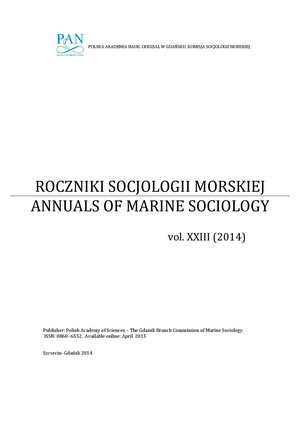Exploring Ecopreneurship in the Blue Growth: A Grounded Theory Approach
Exploring Ecopreneurship in the Blue Growth: A Grounded Theory Approach
Author(s): Tobias Lasner, Ulrich HammSubject(s): Social Sciences
Published by: Polska Akademia Nauk - Oddział w Gdańsku, Komisja Socjologii Morskiej
Keywords: aquaculture; blue growth; diffusion of innovation; ecopreneurship; Everett M. Rogers; fish farmers; grounded theory; qualitative research; social change
Summary/Abstract: Fisheries and aquacultures, the farming of fish, provide people livelihoods in rural and coastal societies all over the world. Fish, mussels, crabs and seaweed are captured in wild seas, lakes, and rivers or farmed in ponds, raceways, and cage cultures. Simultaneously, the fisheries sector faces many challenges: Overfishingendangers biodiversity and the natural regeneration capacity of marine resources; inequality occurs in case of the distribution of fishing permissions and technologies; the skyrocketing economic growth of aquaculture (so called ‘Blue Growth’) can lead to high environmental risks. All these dynamics cause social changes for fishers and fish farmers and in consequence for the future of their enterprises. In particular, the imbalance between supply from overfished oceans and the increasing demand for seafood grows from year to year. Modernising the aquaculture sector and its intensification seem to be the only possibility to close this gap and is one of the most important aims of the current reform of the Common Fisheries Policy of the European Commission. Thus, to match the challenges for marine fisheries in the near future is closely related to the further development of marine and inland aquaculture. But, conventional aquacultures are often connected with environmental risks. One possibility to overcome the environmental challenges and to reduce the pollution output of aquacultures at the same time can be seen in an ecological modernisation of the sector. The central protagonist in an ecological modernisation is the ecological orientated entrepreneur (ecopreneur). In the last decades a few ecopreneurial inland fish farmers have started to adopt two very different ecological innovations: idea−based organic practices or technology−based recirculating aquaculture systems. Nowadays, it is not certain whether these both ‘green’ innovations will diffuse or not in the aquacultural sector. Using the Grounded Theory approach, biographical interviews with German fish farmers, both ecopreneurial pioneers and conventional farmers, were conducted and analysed to carry out the underlying reasons for or against the implementation of ecological innovations from the point of view of the adopting unit: the fish farmers. Building on empirical insights as well as sociologies of social change and diffusion of innovations, a middle−range theory of ecopreneurships in aquaculture was developed, which addressed the apparently simple question: Why do some fish farmers adopt an ecological innovation, and some do not?
Journal: Roczniki Socjologii Morskiej
- Issue Year: 2014
- Issue No: XXIII
- Page Range: 4-20
- Page Count: 17
- Language: English

